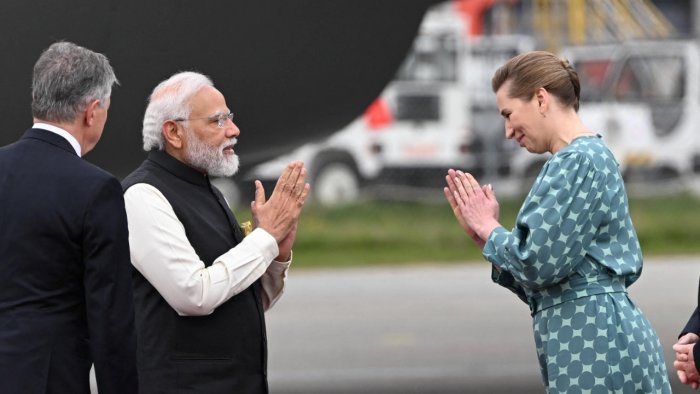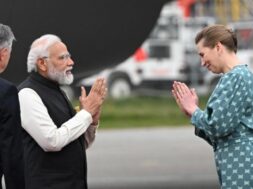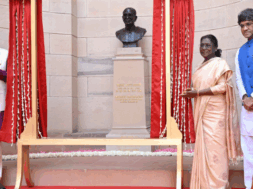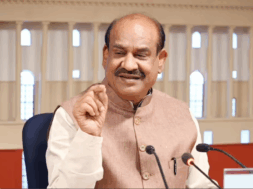
Modi Arrives in Denmark, was Accorded “Special Welcome”
Manas Dasgupta
NEW DELHI, May 3: At the conclusion of his “productive” visit to Germany, the Prime Minister Narendra Modi on Tuesday arrived in Denmark where he met his Danish counterpart Mette Frederiksen and held talks in a discussion ranging from issues of mutual interest to boosting the bilateral relationship.
On the second leg of his three-nation Europe visit, Modi, who arrived in Copenhagen from Germany, was received by the Danish Prime Minister at the airport in what Ministry of External Affairs spokesperson Arindam Bagchi described as a “special gesture.” “Landed in Copenhagen. I am very grateful to PM Frederiksen for the warm welcome. This visit will go a long way in further cementing India-Denmark ties.” Modi tweeted.
It is Modi’s first visit to Denmark, where he will take part in bilateral and multilateral engagements on Tuesday and Wednesday. The Prime Minister had said in his departure statement that the visit would “provide an opportunity to review the progress in our unique ‘Green Strategic Partnership’ with Denmark, as well as other aspects of our bilateral relations. This partnership was translated into a result-oriented five-year action plan during Prime Minister Frederiksen’s India visit in October 2021.”
PM Modi will also meet Queen Margrethe II. He will also attend the India-Denmark Business Roundtable and interact with the Indian community in Denmark. Over 200 Danish companies in India are actively engaged in taking forward ‘Make in India, Jal Jeevan Mission, Digital India and other key national missions. More than 60 Indian companies in Denmark, mainly in the IT sector, are further cementing bilateral business-to-business ties. Denmark is home to an Indian community of 16,000 people.
Apart from the bilateral engagements with Denmark, he will also take part in the 2nd India-Nordic Summit along with Prime Ministers of Denmark, Iceland, Finland, Sweden and Norway where they will take stock of the cooperation since the First India-Nordic Summit in 2018. “The Summit will focus on subjects like post-pandemic economic recovery, climate change, innovation and technology, renewable energy, the evolving global security scenario and India-Nordic cooperation in the Arctic region,” Modi had said.
The summit will focus on economic engagement, green partnership and mobility and cooperation in the Arctic region. “On the sidelines of the Summit, I will also meet the leaders of the other four Nordic countries and review the progress in India’s bilateral relations with them,” Modi had said. “Nordic countries are important partners for India in sustainability, renewable energy, digitisation and innovation. The visit will help in expanding our multifaceted cooperation with the Nordic region,” he added.
Earlier describing his visit to Germany “productive,” the Ministry of External Affairs tweeted, “The first leg of PM @narendramodi’s visit concludes. Has reinforced the India-Germany partnership. Next stop > Copenhagen,” “My Germany visit has been a productive one. The talks with @Bundeskanzler Scholz were extensive and so were the Inter-Governmental Consultations. I got a great opportunity to interact with business and Indian community leaders. I thank the German Government for their hospitality,” Modi tweeted.
During their meeting, Prime Minister Modi and the German Chancellor reviewed the full range of bilateral ties, including giving an impetus to trade as well as cultural linkages. Modi, who co-chaired with Chancellor Scholz the sixth plenary session of the Inter-Governmental Consultations (IGC), invited the German participation in India’s ‘Atmanirbhar Bharat’ (self-reliant India) campaign.
Modi said the partnership between India and Germany could serve as an example of success in a complex world as the two sides inked several agreements focused on sustainable development under which India would receive $10.5 billion in assistance by 2030 to boost the use of clean energy. Modi highlighted the reforms undertaken by his government as he interacted with Indian and German business leaders. He also addressed the Indian community in Berlin.
Modi’s third and final leg of Europe visit will take him on Wednesday to France where he will break an unwritten French convention. Normally, the French President elect makes his first international trip to neighboring Germany to strengthen the Franco-German alliance and expand the European footprint. Socialist President Francois Hollande jetted off to Berlin to meet then German Chancellor Angela Merkel soon after he was elected President on May 15, 2012. His successor Emmanuel Macron did the same five years later when he flew down to meet Chancellor Merkel in 2017. But this time there is a slight change in plans though Germany remains a very close partner of France, like the US and its ally UK.
On Wednesday, the first international visitor that President Macron will physically meet after winning the French election on April 24 is Prime Minister Modi, who will be arriving in France from Copenhagen to especially meet his friend at the Elysée Palace for one-to-one dialogue and delegation level talks built around a dinner. Modi is expected to be in France just for around four to five hours.
Even though PM Modi has a short halt at Paris while enroute to India, the visit is expected to yield significant results with President Macron expected to make a substantial visit to India soon to carry forward the implementation of strategic ideas discussed between the two on Wednesday. The preparations of the visit have already begun in Paris with the agenda of talks being shared through the diplomatic channel. A joint statement of the bilateral meeting is expected to be released after Modi’s meeting with President Macron.
India and France have robust defence cooperation with Paris helping the Indian Navy build Scorpene class submarines and supplying 36 Rafale fighter planes to the Indian Air Force. As of now 35 fighters have already been supplied to India with the last one being used to test India specific enhancements and weaponry in France. France is not only willing to manufacture Safran aircraft engines in India but also hi-tech air to air and air to surface precision missiles.














